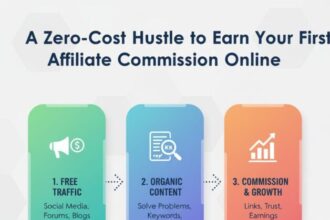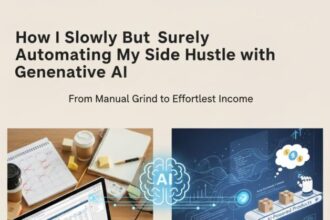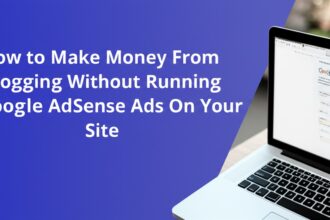How I Finally Started to Drive Organic Traffic to My New Blog (and Why It’s Not What You Think)
I remember staring at my screen, the cursor blinking mercilessly. My first blog post was live. I had put so much of myself into it. I mean, the words just flowed, the images were perfect, and I was so ready for the world to see it. So, I hit “publish.”
And then… nothing.
I checked my analytics every five minutes. The visitor count stayed at a solid, depressing “1”—me. It felt like I’d just whispered a secret into a giant, empty auditorium. I’d read all the advice, the “gurus” with their slick-looking courses, and it all promised to teach me the best tips and secrets to drive organic traffic to my new blog. But it wasn’t working. It didn’t make any sense.
I felt like I was doing everything right. I shared the post on all my social media. My friends and family were so supportive. They’d share it too. But that wasn’t organic traffic. That was just me tapping on the shoulders of the people I already knew. It wasn’t the goal. The goal was for strangers to find me, to read my words, and to stick around. I felt so lost. And honestly, a little embarrassed. It felt like I had thrown a party and nobody showed up. That’s a feeling I wouldn’t wish on anyone. So, what was the deal? I had to figure it out. I just had to.
Chasing the Wrong Dragon: My Initial Hunt for Answers
My first stop was just a full-on research bender. I spent weeks trying to understand how to drive organic traffic to your new blog. I was desperate for a magic button. I read about SEO, backlinks, and keywords. I saw all these charts and graphs. And frankly, it all just gave me a headache. It was a lot to take in. So I tried to just simplify it.
I focused on content marketing strategies. It sounded important, you know? It felt like the answer. The idea was to just produce a ton of content. More articles, more posts, more everything. The logic felt sound. The more you put out, the more chances you have for people to find you, right? I thought I’d just write my way to the top. I just kept producing, day after day. But it felt more like a chore than a passion. It’s hard to stay inspired when you’re writing just to hit a word count. I think I forgot why I started writing in the first place.
Random Social Media Post
I also spent a lot of time on social media. I tried to be everywhere at once. I posted on Facebook, Instagram, and even a little on X. I tried to be active in every single group related to my topic. The time I spent on all those platforms was a lot. In fact, it was probably more than I was spending on actually writing. But it felt like I was supposed to be doing it. All the “experts” said to be present. So I was present. My presence, however, was not moving the needle. It was just exhausting. I was posting, but I wasn’t really engaging. So, what was the point?
At this point, I was ready to give up. The joy was gone. My blog felt like a project. Not a creative outlet. It really felt like a second job, but a job I wasn’t getting paid for. I started to think that maybe I just wasn’t cut out for it. Maybe some people are just natural bloggers. And I, for sure, was not one of them. I started feeling like I was in a race against myself and losing. And that’s a terrible feeling. I started to notice I was getting stressed out every time I sat down to write. My posts weren’t as good. The quality was slipping.
So, I took a step back. I decided to just pause everything. I needed to rethink the whole approach. What if I was looking at this all wrong? It wasn’t about the quantity of what I was doing. It was about the quality. It was about connection. That’s what I finally realized. I needed to stop chasing the numbers. I needed to just focus on the people I was trying to help.
The Big Shift: Finding My Voice and My Audience
I decided to stop. Just completely. I stopped worrying about all the “best practices.” I stopped looking at my analytics. I just went back to the drawing board. I started asking myself different questions. Who am I writing for? Why am I writing this? What would I want to read if I were in their shoes?
This new approach, I think, changed everything. I started focusing on search engine optimization (SEO) in a completely different way. Instead of just stuffing keywords in, I started thinking about what people were actually asking. I would literally type my topic into Google and see what questions popped up. Those were my new headlines. I was trying to solve a real problem for real people. This felt more genuine. I was writing for humans. Not for a machine.
My focus shifted to providing real, tangible value. I wanted to create content that was helpful and shareable. I started to look for ways to make my articles stand out. I realized that a lot of the blogs out there were pretty generic. They all sounded the same. They all used the same stock photos. I knew I needed to be different. I needed to show my personality. So I just started writing like I was talking to a friend. I used humor. I used personal stories. It felt more like me.

I also started to think about the people who were already reading my stuff. Even if it was just a handful of people. I started to engage with them. I would respond to every single comment. I would ask them what they wanted to read next. It felt like I was building a little community. And that felt so much better than just shouting into the void. It made me feel like my work mattered. And when you feel like your work matters, you just want to do more of it.
My First Breakout Moment: The Power of Niche Topics
So, I’m still figuring it all out, right? But something finally clicked for me. I had been writing about a super broad topic. My interests were all over the place. I was writing about travel, food, and tech. It was just a mess. My site looked like a random assortment of ideas. I didn’t have a clear message. So, I just decided to pick one thing. It felt like a risk. It felt like I was cutting off all these other ideas. But it was a risk I was willing to take. I decided to focus on:
digital marketing strategies for small businesses.
I know, it sounds a little boring. But I’m a small business owner myself. So, I know the struggles. I know the questions people are asking. And I realized that a lot of the advice out there was for big corporations. It didn’t apply to people like me. I knew there was a need for simple, actionable advice. So I started writing about that. I wrote about topics that I knew a lot about, but also topics that I was learning about myself. I was literally figuring it out and sharing my journey. I felt a lot more authentic. And, it turns out, people could tell the difference.
My first article that really took off was about email marketing. I wrote a post called “How to Build an Email List from Scratch: A No-Nonsense Guide.” I broke it down into simple steps. I didn’t use any confusing words. I didn’t try to sound like an expert. I was just telling people what I did and what worked. I even included some screenshots of my own email campaigns. It was personal and it was real. I think that’s why it resonated.
I started to get comments and emails from people thanking me. They said my article was the only one that made sense to them. They said it was the first time they felt like they could actually do it. That felt so good. It made all the hard work worth it. That article started getting shared on social media. People were linking to it from their own blogs. It was like a little snowball effect. And the numbers started to rise. It wasn’t a ton. But it was a steady increase. And it felt like a win.
The Underdog’s Secret Weapon: The Art of the Long-Form Post
I think this is a big one. It’s something I wish I had learned sooner. For a while, I was writing these short, quick posts. I thought that’s what people wanted. I thought people had short attention spans. I thought they just wanted the highlights. But I was wrong. It turns out, longer posts can be a huge asset. I’m not saying you need to write a novel every time. But genuine depth, storytelling, and reflection can make a world of difference. The truth is, a lot of the content out there is thin. It’s just a summary of what’s already out there.
A longer post allows you to really dig in. You can tell a story. You can give a detailed walkthrough. You can really show your expertise. For example, I wrote a huge guide on content promotion strategies. It was over 5,000 words. I broke down every single step. I included a ton of examples. I even created a checklist that people could download. It took me weeks to write. It was a ton of work. But it was worth it. That post started ranking for a lot of different keywords. It started showing up in search results for all kinds of questions.
And here’s something I noticed. People who found that post stuck around. They read the whole thing. They left comments. They shared it with their friends. They were looking for a comprehensive resource. They wanted to go deep. And I gave that to them. So, I started doing it for more posts. Not every post. But the ones that needed it. The ones where I had a lot to say. The ones where I had a unique perspective. I think it’s about giving people a reason to stay on your site. And a long, valuable post does just that.
Tapping into Hidden Traffic Streams: Beyond the Basics
Okay, so this is another one of those things that I figured out by accident. My early thinking was that organic traffic was just from Google. That’s it. You write something, it ranks, and people find you. And that is a huge part of it. But it’s not the only part. I started looking at other places where I could get traffic. Places where people were already talking about my topic. I started doing some keyword research to figure out where those conversations were happening. I found some forums and some Q&A sites that were really active.
I started participating in those communities. I wasn’t just dropping links. That’s a surefire way to get banned. I was genuinely trying to help. I would answer people’s questions. I would offer advice. I would share my experiences. And every once in a while, when it was relevant, I would share a link to one of my blog posts. But I was careful. I wanted to be a resource, not a spammer. And it worked. People started clicking on my links. People started checking out my blog. It was a slow trickle. But it was a consistent trickle. And it was pure organic traffic. It was people who were looking for an answer, and I had provided one.
So, I think a big part of this whole puzzle is being where your audience is. And they’re not always on Google. They’re on Reddit, they’re on Quora, they’re in Facebook groups. They’re everywhere. And if you can provide value in those spaces, you can drive traffic back to your own site. It’s like being a good neighbor. You help people out, and they help you out. It’s a simple concept, but it’s one that I completely overlooked at first. It also just feels good. You’re helping people. And that’s really what this is all about, isn’t it?
The Power of the Backlink: The Holy Grail of SEO
This is the one that really felt like a black box for me. Everyone talked about it. Everyone said how important it was. I think I felt a little intimidated by it. It sounded so technical. I thought you had to know someone or have some secret formula. I was so wrong. From what I can tell, building backlinks is just about building relationships. It’s about creating great content that other people want to link to. That’s it. It’s not a black hat SEO technique or some kind of a cheat.
I started by just reaching out to people. I would find bloggers in my niche that I admired. I would read their posts. I would leave thoughtful comments. I would send them an email just to say I liked their work. I wasn’t asking for anything. I was just trying to build a connection. Over time, I started to notice that some of them were linking to my content. Maybe it was an article I wrote that they found interesting. Maybe it was a guide that I created. It felt so good to see my link on someone else’s site. It felt like a vote of confidence.
Guess Posting
I also started doing guest posts. I would reach out to other blogs in my niche. I would offer to write a post for them. I would make sure the post was high-quality. I would make sure it provided a ton of value. And in return, I would get a link back to my site. This was a game changer. It not only helped with my SEO, but it also introduced my blog to a new audience. It was a win-win. So basically, you’re not just writing a post. You are becoming a part of the conversation. And when you do that, people start to notice you. And they start to link to you.
I think the key is to be helpful. To be a resource. To be a good community member. Ultimately, the best way to get backlinks is to have great content. I know, it sounds a little too simple. But it’s the truth. If your content is so good that people want to share it, they will. They will link to it. And that’s how you get those high-quality backlinks that the search engines love.
The Final, Hard-Earned Lesson: It’s a Marathon, Not a Sprint
I think the biggest secret of all is that there are no secrets. There’s no magic button. There’s no quick fix. The best tips and secrets to drive organic traffic to your new blog aren’t tips at all. They’re principles. They’re a long-term commitment. It’s about being consistent. It’s about being patient. I think that’s the one thing that all those other articles missed. They made it sound so easy. But it’s not. It’s hard work. But it’s the kind of work that pays off in the end. It’s the kind of work that builds something real.
I’m still at it. I’m still learning. I’m still making mistakes. I just try to be a little better every day. I’m not looking for overnight success. I’m looking for a steady, gradual climb. I think that’s the real goal. So, if you’re feeling a little lost right now, I get it. I’ve been there. I’ve felt that crushing weight of disappointment. But don’t give up. Take a deep breath. Start with one thing. Just one. And then, once you’ve got that down, move on to the next.
I’m so glad I didn’t give up. I’m so glad I kept going. The feeling of seeing that first comment from a complete stranger who found me through a search engine is just incredible. It’s proof that what I’m doing is working. And it’s proof that you can do it too. It’s a journey. And it’s a journey worth taking.
I also want to touch on a few things that have been game-changers for me, stuff that I think a lot of people overlook. I’ve found that paying attention to my on-page SEO has made a big difference. This means making sure my meta descriptions and title tags are super compelling. It’s the first thing people see in a search result. It’s like the headline of an article. If it’s not interesting, they’ll just keep scrolling. I’ve started writing these with the reader in mind, not just the search engine. My motto is that if a human won’t click on it, a robot won’t either. I’m also really picky about my internal links. I try to make sure they’re always relevant and useful. I’ve noticed it helps people stay on my site longer. You can check out some of my other articles, like this one on how to use internal links effectively, at eezor.com.
Another thing I’ve been experimenting with is schema markup. It sounds technical, but it’s basically just a way to help search engines understand your content better. It helps you get those cool-looking rich snippets in search results. I’ve noticed a small increase in my click-through rate since I started using it. It’s a small change, but it’s an important one. According to a study from a few years back, rich snippets can boost your click-through rate significantly.
The Most Important Take
Ultimately, I think the most important thing is to just keep creating great content. I’ve read some advice that says you should only create a few posts, but I disagree. I think you need a solid body of work. I’ve found that having a lot of high-quality content helps you rank for a wider variety of keywords. A larger body of work just gives you more shots on goal. I’ve also learned the value of a strong content strategy. It’s like having a road map for your blog. It helps you stay focused and on track. You can read more about my content strategy here on the eezor.com blog.
Lastly, I’ve found that using organic search tactics goes beyond just writing. It’s about building a community. It’s about connecting with people. It’s about being a resource. And it’s about being patient. I think that’s the one thing that all those other articles missed. They made it sound so easy. But it’s not. It’s hard work. But it’s the kind of work that pays off in the end. It’s the kind of work that builds something real. It’s a marathon, not a sprint. And I’m just happy to be running the race.
So, where do you think you’ll start your journey to better organic traffic?


































